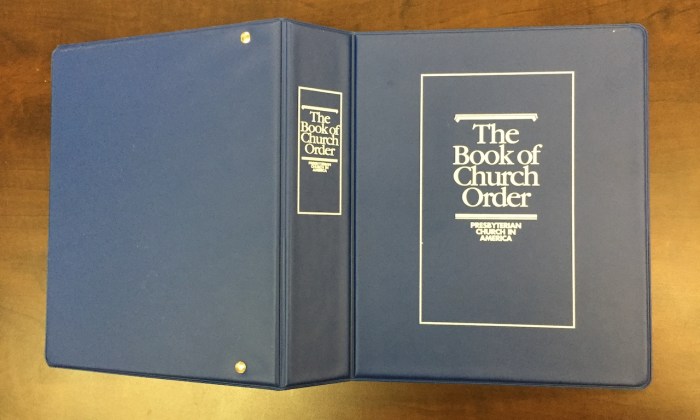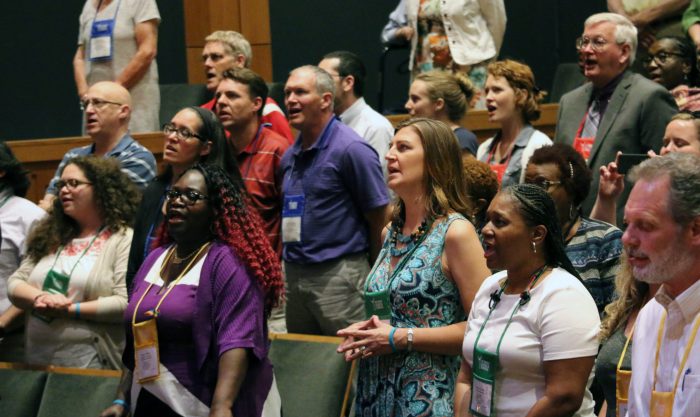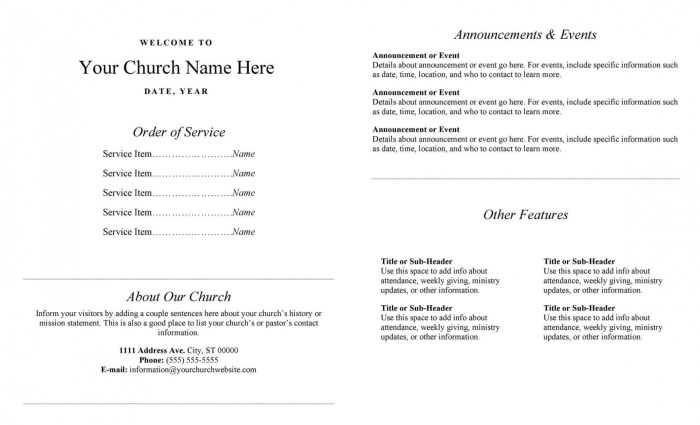Welcome to our exploration of the RCA Book of Church Order, a comprehensive guide that shapes the life and ministry of the Reformed Church in America. This foundational document provides a roadmap for worship, governance, and discipline, ensuring that our faith community remains rooted in its theological foundations while adapting to the ever-changing landscape of our time.
In the following sections, we will delve into the historical origins, theological principles, and practical applications of the RCA Book of Church Order, offering insights into its significance for the Reformed tradition and its relevance in today’s world.
Historical Background

The Reformed Church in America (RCA) Book of Church Order is a collection of rules and regulations that govern the church’s polity, worship, and discipline. It is a living document that has been revised and updated over the centuries to reflect the changing needs of the church.
The RCA Book of Church Order, a comprehensive guide to church governance, provides a solid foundation for church leadership. Interestingly, a recent study on the NYS SBL Exam Pass Rate here revealed insights into the effectiveness of church leadership training programs.
Returning to the RCA Book of Church Order, its emphasis on accountability and transparency fosters a culture of integrity within church organizations.
The origins of the RCA Book of Church Order can be traced back to the Dutch Reformed Church, which was established in the Netherlands in the 16th century. The Dutch Reformed Church developed a set of church orders that were based on the teachings of John Calvin.
These church orders were brought to America by the Dutch colonists who founded the RCA in 1628.
The Synod of Dort
The Synod of Dort, held in 1618-1619, was a pivotal event in the history of the RCA Book of Church Order. The Synod of Dort adopted the Canons of Dort, which were a set of doctrinal statements that defined the Reformed faith.
The Canons of Dort had a significant influence on the development of the RCA Book of Church Order.
The Westminster Assembly
The Westminster Assembly, held in 1643-1649, was another important event in the history of the RCA Book of Church Order. The Westminster Assembly produced the Westminster Confession of Faith, which is a confession of faith that is still used by many Reformed churches today.
The Westminster Confession of Faith had a significant influence on the development of the RCA Book of Church Order.
The First Book of Church Order
The first Book of Church Order of the RCA was adopted in 1792. This book was based on the church orders of the Dutch Reformed Church and the Westminster Confession of Faith. The first Book of Church Order was a relatively simple document that contained only a few dozen pages.
The Second Book of Church Order
The second Book of Church Order of the RCA was adopted in 1832. This book was a more comprehensive document than the first Book of Church Order. It contained over 200 pages and covered a wide range of topics, including polity, worship, and discipline.
The Third Book of Church Order
The third Book of Church Order of the RCA was adopted in 1957. This book was a major revision of the second Book of Church Order. It was written in a more modern style and reflected the changing needs of the church.
The Fourth Book of Church Order
The fourth Book of Church Order of the RCA was adopted in 1996. This book was a minor revision of the third Book of Church Order. It was written in a more gender-inclusive style and reflected the changing needs of the church.
Structure and Content

The RCA Book of Church Order is a comprehensive guide to the governance and practices of the Reformed Church in America (RCA). It is divided into three main sections:
- Part I: The Constitution
- Part II: The Bylaws
- Part III: The Directories
Part I: The Constitutionestablishes the fundamental principles and doctrines of the RCA. It includes articles on the nature of the church, the sacraments, and the ministry.
Part II: The Bylawsprovide more specific regulations for the governance of the RCA. They cover topics such as the election of officers, the organization of congregations, and the financial management of the church.
Part III: The Directoriescontain practical guidelines for the worship, education, and mission of the RCA. They include sections on liturgy, music, Christian education, and evangelism.
Theological Foundations
The Reformed theological principles underpinning the RCA Book of Church Order are deeply rooted in the teachings of John Calvin and other Protestant Reformers. These principles emphasize the sovereignty of God, the authority of Scripture, and the importance of church governance and discipline.
Sola Scriptura
The principle of sola scriptura(Scripture alone) holds that the Bible is the sole source of authority for Christian faith and practice. The RCA Book of Church Order reflects this principle by emphasizing the importance of biblical literacy and the use of Scripture in all aspects of church life.
Sovereignty of God
The Reformed tradition teaches that God is sovereign over all creation, including the church. This principle is reflected in the book’s emphasis on God’s authority in matters of church governance and discipline.
Predestination
The doctrine of predestination, which teaches that God has chosen certain individuals for salvation, is also reflected in the book’s emphasis on the importance of election and the role of the Holy Spirit in calling and equipping ministers.
Covenant Theology
The Reformed tradition emphasizes the importance of covenant theology, which views the relationship between God and his people as a covenant or agreement. This principle is reflected in the book’s emphasis on the importance of membership, baptism, and the Lord’s Supper as expressions of the covenant relationship.
Church Governance
The Reformed tradition places a strong emphasis on the importance of church governance and discipline. The RCA Book of Church Order reflects this principle by providing a detailed framework for the organization and governance of the church, including the roles of elders, deacons, and ministers.
Ecclesiastical Polity

The RCA Book of Church Order Artikels the ecclesiastical polity of the Reformed Church in America, which is a Presbyterian denomination. The polity is based on the principles of representative government and the sovereignty of Christ over the church.
The RCA is governed by a system of representative government, with each level of church government being accountable to the level above it. The highest level of church government is the General Synod, which meets annually and is composed of delegates from each local church.
The General Synod is responsible for setting the denomination’s doctrine, polity, and practice.
Levels of Church Government
The RCA has three levels of church government: the local church, the classis, and the General Synod.
- The local church is the basic unit of church government. Each local church is governed by a session, which is composed of the pastor and elders. The session is responsible for the spiritual and temporal affairs of the church.
- The classis is a regional body that is composed of delegates from the local churches in a particular area. The classis is responsible for overseeing the local churches in its region and for resolving disputes between churches.
- The General Synod is the highest level of church government in the RCA. The General Synod is responsible for setting the denomination’s doctrine, polity, and practice.
Roles of Church Officers, Rca book of church order
The RCA has four types of church officers: pastors, elders, deacons, and deaconesses.
- Pastors are ordained ministers who are responsible for the spiritual leadership of the church. They are responsible for preaching, teaching, and administering the sacraments.
- Elders are lay leaders who are responsible for the temporal affairs of the church. They are responsible for overseeing the church’s finances, property, and personnel.
- Deacons are lay leaders who are responsible for the care of the poor and needy. They are also responsible for assisting the pastor in the administration of the sacraments.
- Deaconesses are lay leaders who are responsible for the care of the sick and needy. They are also responsible for assisting the pastor in the administration of the sacraments.
Relationship Between the Local Church and the Broader Denomination
The local church is the basic unit of church government in the RCA. However, the local church is not independent of the broader denomination. The local church is accountable to the classis and the General Synod. The classis and the General Synod have the authority to oversee the local church and to resolve disputes between churches.
Worship and Sacraments
Worship and sacraments are central to the spiritual life of the Reformed Church in America (RCA). The Book of Church Order provides guidance on the principles and practices of worship, as well as the administration of the sacraments.
Principles of Worship
The RCA Book of Church Order emphasizes the importance of corporate worship as a gathering of the community of faith. Worship is seen as a response to God’s grace and a means of expressing gratitude and adoration. The book encourages a variety of worship styles, including traditional, contemporary, and blended, to accommodate the diverse needs of congregations.
The Sacraments
In the Reformed tradition, the sacraments are visible signs of God’s grace. The RCA Book of Church Order recognizes two sacraments: Baptism and the Lord’s Supper.
Baptism
Baptism is a sacrament of initiation into the Christian faith. It symbolizes the washing away of sins and the new life in Christ. The book provides guidelines for the administration of baptism, including the use of water and the formula, “In the name of the Father, and of the Son, and of the Holy Spirit.”
The Lord’s Supper
The Lord’s Supper is a sacrament of remembrance and communion. It symbolizes the sacrifice of Christ and the unity of the church. The book provides guidelines for the administration of the Lord’s Supper, including the use of bread and wine and the words of institution.
Ministry and Ordination
The RCA places great importance on the ordained ministry, viewing it as a sacred calling from God. Ordination is the formal recognition and authorization of an individual to serve as a minister within the church. The process of ordination involves several steps, including a period of theological education, practical training, and examination by a committee of the church.The
RCA recognizes three types of ordained ministry: pastor, deacon, and elder. Pastors are responsible for the spiritual care and leadership of a congregation. Deacons serve the church through acts of compassion and mercy. Elders provide spiritual guidance and oversight to the congregation.The
Book of Church Order shapes the training and deployment of ministers in several ways. It sets forth the educational requirements for ordination, which include a bachelor’s degree, a Master of Divinity degree, and a period of supervised ministry. The Book of Church Order also establishes the process for examining and ordaining candidates for ministry, ensuring that they meet the church’s standards for theological knowledge, practical skills, and spiritual maturity.
Educational Requirements
The Book of Church Order requires that all candidates for ordination must have a bachelor’s degree from an accredited college or university. In addition, candidates must complete a Master of Divinity degree from an accredited theological seminary. The Master of Divinity program typically takes three years to complete and includes coursework in biblical studies, theology, church history, and practical ministry.
Examination and Ordination
After completing their theological education, candidates for ordination must undergo an examination by a committee of the church. The examination covers a range of topics, including the candidate’s theological knowledge, practical skills, and spiritual maturity. Candidates who successfully pass the examination are then ordained by the church and authorized to serve as ministers.
Church Discipline
The RCA Book of Church Order provides principles and procedures for church discipline, aiming to maintain the purity of the church, restore erring members, and protect the unity and reputation of the congregation.
Church discipline is applied when a member’s conduct or beliefs violate the standards of the church. It is not a form of punishment but rather a means of reconciliation and restoration.
Principles of Church Discipline
- Love and Restoration:Discipline is guided by love for the erring member and a desire to restore them to fellowship.
- Gradual Process:Discipline is a gradual process that involves several steps, including private admonition, public rebuke, and potential exclusion from the church.
- Due Process:Members facing discipline have the right to a fair and impartial hearing, with opportunities to present their case and seek support.
Procedures for Church Discipline
The RCA Book of Church Order Artikels the following procedures for church discipline:
- Private Admonition:The pastor or other church leader privately addresses the erring member, expressing concern and seeking repentance.
- Public Rebuke:If private admonition fails, the church council may issue a public rebuke, expressing the church’s disapproval of the member’s conduct or beliefs.
- Exclusion:As a last resort, the church council may exclude the erring member from the church. This is a solemn act that is only taken after careful consideration and prayer.
Scope of Church Discipline
Church discipline is applicable to a wide range of offenses, including:
- Immoral conduct
- False doctrine
- Divisive behavior
- Disobedience to church authority
The RCA Book of Church Order provides guidance on how to handle specific disciplinary matters, such as:
- Alcohol and drug abuse:The church encourages seeking professional help and offers support and accountability.
- Sexual misconduct:The church takes a serious view of sexual misconduct and provides resources for victims and perpetrators.
- Financial impropriety:The church promotes financial integrity and may discipline members involved in dishonest financial practices.
Contemporary Applications: Rca Book Of Church Order

The RCA Book of Church Order continues to play a vital role in the life and ministry of the Reformed Church in America (RCA). It provides a framework for worship, governance, and ministry that has been adapted to meet changing circumstances.
The book has been revised several times over the years to reflect the changing needs of the church. The most recent revision, adopted in 2016, includes updates on issues such as same-sex marriage and the ordination of women.
Examples of Adaptation
- The book’s provisions for worship have been adapted to allow for a variety of worship styles, from traditional to contemporary.
- The book’s provisions for governance have been adapted to allow for greater participation by laypeople in the decision-making process.
- The book’s provisions for ministry have been adapted to allow for a variety of ministries, from traditional pastoral ministry to new forms of ministry such as chaplaincy and counseling.
Common Queries
What is the purpose of the RCA Book of Church Order?
The RCA Book of Church Order provides a comprehensive framework for the governance, worship, and discipline of the Reformed Church in America, ensuring unity and consistency in its practices and beliefs.
How does the RCA Book of Church Order reflect Reformed theological principles?
The RCA Book of Church Order is rooted in the Reformed tradition, emphasizing the sovereignty of God, the authority of Scripture, and the importance of the sacraments. These principles shape the book’s teachings on worship, governance, and ministry.
What are the different levels of church government Artikeld in the RCA Book of Church Order?
The RCA Book of Church Order establishes three levels of church government: the local church, the regional classis, and the national synod. Each level has specific responsibilities and authorities, ensuring a balance of power and accountability.